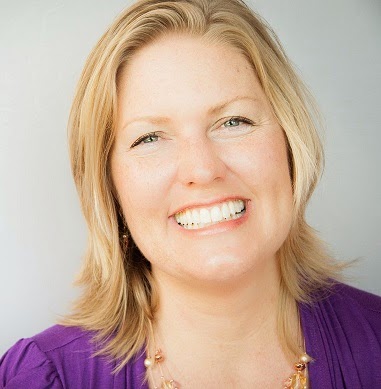Special needs parents need to take care of themselves too
Part
2 of an interview with Laurie Wallin,
Author of Get Your Joy Back
As special
needs parents fight tooth-and-nail for the best life for their child, their
mental, emotional and spiritual reserves quickly deplete. Wallin offers
replenishment in her book, Get Your Joy
Back: Banishing Resentment and Reclaiming Confidence in Your Special Needs
Family (Kregel
Publications/January 27, 2015/ISBN: 978-0825443398/$13.99). “I’ve been married for 16
years to a man with a wicked sense of humor and an Asperger’s diagnosis,” she
reveals. “Two of our four daughters have half a dozen medical, developmental
and mental health special needs. Daily we try to balance their care with
‘normal’ family stuff like sports, homework and my desire to lock myself in a
closet and watch entire seasons of Downton
Abbey in a single night.”
Q: What
makes Get Your Joy Back stand apart
from other books written to special needs parents?
It’s not about the kids. It’s about the parents —
the primary caregivers, specifically. There just isn’t much out there for the
people who are parents of these special kids. Our lives become about getting
our kids the best possible care, and we can nearly become invisible. It effects
our health, life expectancy, quality of life, relationships, careers . . . and
we often feel like that’s just how it is and there’s nothing to be done about
it. This book says, from a fellow parent in the trenches: “You’re still there.
I see you. And you matter, beyond your role as Mom or Dad.”
Q: What did
you mean when you said this book will help parents “stop the madness”?
The madness is the treadmill on which we find
ourselves as parents. The “keep trying harder, keep ignoring what hurts you,
keep putting off your needs, keep doing, doing, doing” treadmill. This book
gives parents permission to get off that treadmill and provides the practical
tools to release resentments, lower stress and replace unhealthy thought
patterns with ones that restore joy in their lives and relationships.
Q: Why do
special needs parents often feel so isolated?
They’re isolated by their child’s needs and
schedules, as well as by misunderstandings with people they know. Every family is constrained by a 24-hour day,
and even for families without a special needs child, there aren’t enough hours
in the day to get everything done. However, for parents of special needs
children, instead of the occasional doctor’s appointment or meeting, these
families’ days are full of trips to therapists, doctors, pharmacies, meetings
at the school and calls to work with insurance providers and medical suppliers.
Many of the parents I interviewed for the book
have also felt judgment and misunderstanding from peers, churches and
communities, such that they shy away from pursuing relationships. That was one
of the primary reasons for writing this book: to invite weary parents to see a
way out of the stress and isolation so they can feel whole and thrive again.
Airlines instruct passengers that when the cabin
pressure changes and oxygen masks drop down, we’re to put on our own before
helping anyone else with theirs. We lose that principle somewhere in the
life-and-death, post-traumatic, stress-inducing experiences we have as parents
of kids with special needs. At some point the diagnosis is made and our child’s
new normal begins to form, but ours never does. We stay on high-alert forever.
We know our kids depend on us, but we don’t translate that into giving
ourselves permission to take care of ourselves enough to support that load.
Q: Do you
have moments when you aren’t sure you can make it through the day? What gets
you through?
It’s a more unusual day when I DON’T have moments
like that! So, yes. How do I make it through while my teen who has bipolar
disorder and learning disabilities is melting down over three math problems,
and her sister needs my attention because her seizures are outrunning her
medications? I do it doused in reminders of God’s grace, listening to inspiring
music, the audio Bible, even spoken word slam poetry from my favorite Christian
artist. (Notice the theme? Audio. I’m able to stream it while doing all the other
parenting stuff, if needed.) I do it by talking to God like He’s standing there
with me, complete with griping, begging, crying or whatever is needed in the
moment.
I do it by getting a little more sleep on the hard
days, eating balanced meals (and setting a timer if I have to, so I don’t dip
too low on the blood sugars), getting into the sunshine every day, using
lotions with scents that evoke calm, drinking tea and having a super-secret
stash of salted dark chocolate with almonds.
I also applied to public programs for respite and
money to assist in having a trained caregiver in the house who isn’t just there
for my kids; she is my right arm in whatever way I need help in the house . . .
or if I just need a time out to walk a few laps around the block.
Q: Parents
of special needs kids have unique pressures on their marriage. How have you
made your marriage a priority, even in the midst of caring for your children?
We’ve made weekly date nights a non-negotiable.
There is no substitute for time together, alone. Even when we’ve had little
money and no babysitting options available, we’ve found morning or mid-day
times while kids were at school or appointments to spend an hour, just the two
of us. It’s crucial to have that regularly planned time that says, “We still
matter as a couple, apart from the kids and their needs.”
Learn
more about Laurie Wallin and Get Your Joy
Back at www.lauriewallin.com
and on Facebook
(LivingPowerLifeCoaching),
Pinterest
(lauriewallin)
or Twitter
(mylivingpower).


Comments